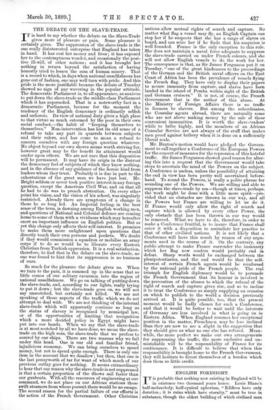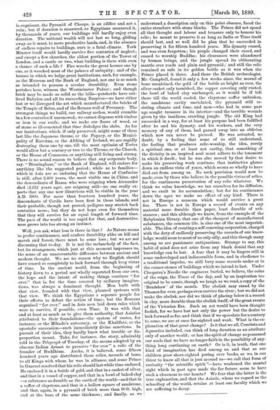ENGLISH FORESIGHT.
IT is probable that nothing now existing in England will be in existence two thousand years hence. Louis Blanc's half-melancholy, half-cynical aphorism, "Edifices have only duration ; it is ruins which have eternity," must be true in substance, though the oldest building of which civilised man
is cognisant, the Pyramid of Cheops, is an edifice and not a ruin; but if duration is measured, as Egyptians measured it, by thousands of years, our buildings will hardly enjoy even duration. The national wealth will not last so long, gliding away, as it must, to more productive lands, and, in the absence of endless repairs to buildings, ours is a fatal climate. York Minster itself would hardly survive five centuries of neglect; and except a few churches, the oldest portion of the Tower of London, and a castle or two, what building is there with even a chance of such a life ? Fire wrecks the great houses one by one. as it wrecked most of the palaces of antiquity; and of the houses in which we lodge great institutions, such, for example, as the Museum and the Bank of England, not one is so much as intended to possess a secular durability. Even stone perishes here, witness the Westminster Palace ; and though brick may be made as solid as the hills—potsherds have out- lived Babylon and all its succeeding Empires—we have either lost or we disregard the art which manufactured the bricks of the Temple of Belus, and of the Roman wall of Pevensey. The strongest things we build, our railway arches, would crumble in a few centuries if unrenewed ; we cannot dispense with timber or iron in our roofs; and we make our floors of wood, or of atone so ill-cemented that time dislodges the slabs. As for our institutions, which, if only preserved, might some of them last like the Japanese throne, or the Papacy, or the Munici- pality of Ravenna, or the Althing of Iceland, we are rapidly destroying them one by one, till the most optimist of Tories would allow but a century or two to the Throne, or the Church, or the House of Commons, or anything still living and strong. There is no sound reason to believe that any corporate body, say, " Birmingham," or the Bank of England, will endure for anything like the suggested period ; while as to families— which in Asia are so enduring that the House of Confucius is still, after 2,400 years, the most visible one in China, and the descendants of Rama, who were reigning when Alexander died (2,212 years ago), are reigning still—no one really ex- pects that any one now illustrious will be visible in the year A.D. 3800. For more than fourteen hundred years, the descendants of Cerdic have been first in these islands, and their probable, though not proved, pedigree may stretch back centuries more; but they do not hope even for themselves that they will survive for an equal length of forward time. The pace of the world is too rapid for that, and destructive- ness grows into too strong an instinct.
Well, you ask, what loss is there in that ? As Nature seems to prefer continuance, and confers durability alike on hill and marsh and forest, there must be some loss ; but we are not discussing that to-day. It is not the melancholy of the fact, but its strangeness, which just at this moment impresses us, the sense of an unaccountable difference between ancient and modern thought. We see no reason why we English should have ceased so completely to look forward through long vistas of time. In the ancient world, from the beginning of history down to a period not wholly separated from our own, the hope and the intent of making things continue " for ever," that is, for the time covered by ordinary imagina- tions, was always a dominant thought. Men built with that view, founded with that view, planned systems with that view. We think the Egyptians a separate people for their efforts to defeat the action of time ; but the Romans organised " for ever," and in Asia men laid down rules which were to survive, if possible, even Time. It was with that end at least as much as to give them authority, that Asiatics attributed to their foundations—the system of castes, for instance, or the Mikado's autocracy, or the Khalifate, or the apostolic succession—such immediately divine sanctions. In pursuit of their idea, they hardly knew what trouble or dis- proportion meant. Take, for instance, the story, admirably told in the Telegraph of Tuesday, of the means adopted by an obscure Indian dynast to preserve "for ever" a relic of the founder of Buddhism. Asoka, it is believed, some fifteen hundred years ago distributed these relics, morsels of bone, to all Kings with whom be was in alliance, and some Prince in Guzerat resolved that his relic should last while time endured. He enclosed it in a bottle of gold, and that in a casket of silver, and that in a vessel of copper, and that in a bowl of baked clay —a substance as durable as the earth of the world—and that in a coffer of claystone, and that in a hollow square of sandstone, and that, again, in a pyramid of brick more than 80 ft. high, and at the base of the same thickness ; and finally, as we understand a description only on this point obscure, faced the entire structure with stone blocks. The Prince did not spend all that thought and labour and treasure only to honour his relic ; he meant to preserve it as long as India or Time itself should last, and so well did he plan that he succeeded in preserving it for fifteen hundred years. His dynasty ceased, and was even forgotten ; his people changed their creed, and ceased to worship Buddha; his clearances were abandoned by human beings, and the jungle spread its obliterating mantle over roads and plain and pyramid ; and still the relic remained as safe in its golden bottle as it was when the Prince placed it there. And there the British archaeologist, Mr. Campbell, found it only a few weeks since, the morsel of bone uncalcined, the gold of the bottle as bright as ever, the silver casket only tarnished, the copper covering only rusted, the bowl of baked clay unchanged, as it would be if left there till the world cooled, the claystone coffer unbroken, the sandstone cavity unviolated, the pyramid still re- sisting climate and time, and men—who had in some past age sought treasure in its interior—and the terrible wounds given by the insidious, crawling jungle. The old King had succeeded in a way, for at least his purpose had been fulfilled after he and his dynasty, and his workers, and the very memory of any of them, had passed away into an oblivion which now can never be pierced. He was actuated, no doubt, by a feeling that some of us still understand, the feeling that produces relic-worship, the idea, surely a spiritual one, or at least not earthy, that something of the divinity in an inspired soul must adhere to the tenement in which it dwelt ; but he was also moved by that desire to make his preserving work continue, that instinctive glance down an endless vista of years, which seems so wholly to have died out from among us. No such provision would now be made, even by those who believe in the possible virtue of relics, for the continuous preservation of any relic whatever. We think we value knowledge, we tax ourselves for its diffusion, and we exult in its accumulation ; but for its continuance down the ages we make no effort of any kind. There is not in Europe a museum which would survive a great fire. There is not in Europe a record of events on any material more durable than paper, least durable of sub- stances ; and this although we know, from the example of the Babylonian library, that one of the cheapest of manufactured substances, the common tile, is also one of the most imperish- able. The idea of creating a self-renewing corporation, charged with the duty of endlessly preserving the records of our know- ledge, would seem to most of us only silly, and this though many among us are passionate antiquarians. Strange to say, this habit of mind does not arise from any blank denial that any knowledge can be lost. A fear that it may be lingers still in some undeveloped and indiscernible form, and in obedience to a traditional impulse, we still bury some records under or in the corner-stones of buildings which we intend to last. Under Cleopatra's Needle the engineers buried, we believe, the coins of the reign, the Times of the day, and by an inspiration too original to be comic, though we laugh as we read, a copy of the Bradshaw' of the month. The obelisk may stand by the Thames for ever, perhaps even survive the river ; but we did not make the obelisk, nor did we think of placing below it a record in clay, more durable than the obelisk itself, of the great events of the Victorian Era. Such an act would have been thought foolish, for we have lost not only the power but the desire to look forward so far, and think that if we speculate for a century to come, we are at once far-sighted and weak. What is the ex- planation of that great change? Is it that we all, Comtists and Agnostics included, can think of long duration as an attribute only of another world ; or has the spirit of change so possessed our souls that we have no longer faith in the possibility of any- thing long continuing on earth ? Or is it, in truth, that one kind of imagination has died among us, and that as our children grow short-sighted poring over books, so we, in our thirst to know all that is just around us—we call that form of curiosity " the scientific spirit "—have weakened the mental sight which in past ages made the far future seem to have such a closeness to our hearts P We fear that the latter is the true explanation, and that the Asiatic, whom we regard as the schoolboy of the world, retains at least one faculty which we are suffering to decay.



















































 Previous page
Previous page